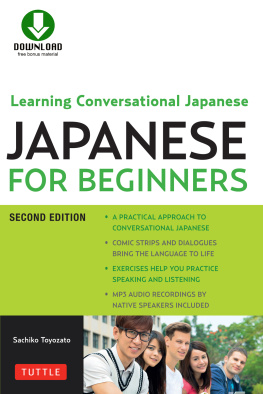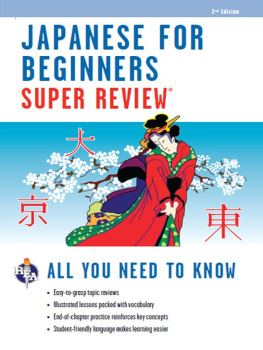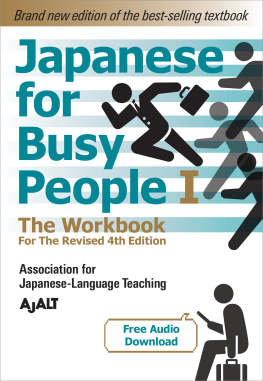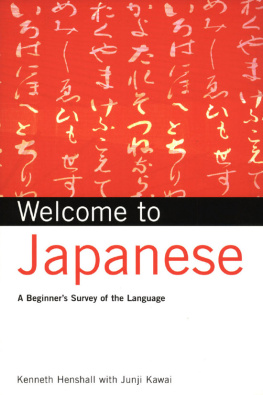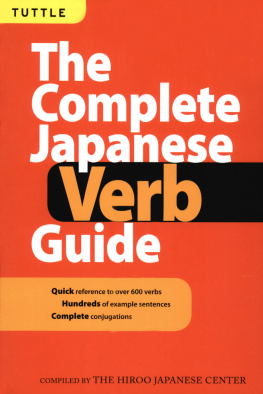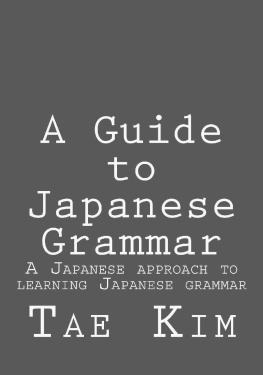Acknowledgments
I am deeply grateful to two people in particular: Ms. Kathy Diener and Ms. Stacy Shaneyfelt (M.A.) who offered invaluable suggestions and patiently checked my English over the long period this book ultimately took from start to finish.
I would also like to express my thanks to Ms. Atsuko Maruhashi (B.A.), Mr. Marice Dee Frandsen (M.A.), Ms. Saori Hirakawa (M.A.), students at the Kadena USO, students of Okinawa Kokusai University/University of Ryukyu, and many others for their cooperation in the completion of this book.
Lastly I would like to thank Mr. John Purves (Ph.D.) and his wife Ms. Rachel Stevenson (M.A.) who edited my final draft and gave me a lot of comments and advice.
Appendix A
NOUN + SURU REFERENCE Nouns (except for concrete nouns) can be changed into verbs by adding the irregular verb suru (to do). They are then conjugated in the same way as suru .
It is usually possible to insert the particle o between a noun and suru without changing the meaning. This is because the noun can be made into an object with the addition of the particle o after a noun.
Here is a list of some nouns with suru added.
NOUN | VERB |
| ai (love) | ai suru (to love) |
| annai (guide) | annai suru (to guide) |
| anshin (relief) | anshin suru (to feel relieved) |
| benky (studying) | benky suru (to study) |
| bikkuri (surprises) | bikkuri suru (to be surprised) |
| chmon (an order of goods) | chmon suru (to order) |
| chi (caution) | chi suru (to caution) |
| daietto (diet) | daietto suru (to be on a diet) |
| dansu (dancing) | dansu suru (to dance) |
| denwa (telephone) | denwa suru (to make a phone call) |
| doryoku (effort) | doryoku suru (to make an effort) |
| enki (postponement) | enki suru (to postpone) |
| henpin (returned goods) | henpin suru (to send back goods) |
| junbi (preparation) | junbi suru (to prepare) |
| kaimono (shopping) | kaimono suru (to do shopping) |
| kekkon (marriage) | kekkon suru (to marry) |
| manzoku (satisfaction) | manzoku suru (to be satisfied) |
| nyka (fresh supply of goods) | nyka suru (to receive goods) |
| onegai (request) | onegai suru (to request) |
| renraku (contact) | renraku suru (to contact) |
| rensh (practice) | rensh suru (to practice) |
| rikon (divorce) | rikon suru (to get divorced) |
| riy (utilization) | riy suru (to utilize) |
| ryri (cooking) | ryri suru (to cook) |
| ryok (travel) | ryok suru (to travel) |
| sanpo (walk) | sanpo suru (to take a walk) |
| setsumei (explanation) | setsumei suru (to explain) |
| shigoto (work) | shigoto suru (to work) |
| shinpai (worry) | shinpai suru (to worry) |
| shippai (failure) | shippai suru (to fail) |
| shitsumon (question) | shitsumon suru (to ask a question) |
| shitsurei (rudeness) | shitsurei suru (to excuse) |
| shiy (use) | shiy suru (to use) |
| shokuji (meal) | shokuji suru (to have a meal) |
| shkai (introduction) | shkai suru (to introduce) |
| shukudai (homework) | shukudai suru (to do homework) |
| sdan (consult) | sdan suru (to consult) |
| sotsugy (graduation) | sotsugy suru (to graduate) |
| tenisu (tennis) | tenisu suru (to play tennis) |
| unten (driving) | unten suru (to drive) |
| und (exercise) | und suru (to exercise) |
| yakusoku (promise) | yakusoku suru (to make a promise) |
| yotei (schedule) | yotei suru (to schedule) |
| yoyaku (reservation) | yoyaku suru (to make a reservation) |
Appendix B
TABLE OF VERB CONJUGATIONS
Dictionary Form | Masu Form | Te Form | Nai Form | Volitional Form |
| ageru (give) | agemasu | agete | agenai | agey |
| aisu (love) | aishimasu | aishite | aisanai | ais |
| akeru (open) (vt.) | akemasu | akete | akenai | akey |
| akirameru (give up) | akiramemasu | akiramete | akiramenai | akiramey |
| aku (open) (vi.) | akimasu | aite | akanai | ak |
| arau (wash) | araimasu | aratte | arawanai | ara |
| aru (exist) | arimasu | atte | (nai) | ar |
| aruku (walk) | arukimasu | aruite | arukanai | aruk |
| asobu (play/enjoy) | asobimasu | asonde | asobanai | asob |
| atsumaru (assemble) | atsumarimasu | atsumatte | atsumara-nai | atsumar |
| au (meet) | aimasu | atte | awanai | a |
| benky suru | benky | benky | benky | benky |
| (study) | shimasu | shite | shinai | shiy |
| butsukeru (bump) | butsukemasu | butsukete | butsukenai | butsukey |
| chigau (differ) | chigaimasu | chigatte | chigawanai | chiga |
| dasu (take out) | dashimasu | dashite | dasanai | das |
| dekakeru (go out) | dekakemasu | dekakete | dekakenai | dekakey |
| dekiru (can do) | dekimasu | dekite | dekinai | dekiy |
| deru (leave) | demasu | dete | denai | dey |
| erabu (choose) | erabimasu | erande | erabanai | erab |
| fuku (wipe) | fukimasu | fuite | fukanai | fuk |
| furu (fall rain) | furimasu | futte | furanai | fur |
| futoru (gain weight) | futorimasu | futotte | futoranai | futor |
| ganbaru (work hard) | ganbarimasu | ganbatte | ganbaranai | ganbar |
| hairu (enter) | hairimasu | haitte | hairanai | hair |
| hajimeru (begin) | hajimemasu | hajimete | hajimenai | hajimey |
| hakobu (carry) | hakobimasu | hakonde | hakobanai | hakob |
| haku (put on shoes) | hakimasu | haite | hakanai | hak |
| hanasu (speak) | hanashimasu | hanashite | hanasanai | hanas |
| harau (pay) | haraimasu | haratte | harawanai | hara |
| hashiru (run) | hashirimasu | hashitte | hashiranai | hashir |
| hataraku (work) | hatarakimasu | hataraite | hatarakanai | hatarak |
| hiku (pull/play) | hikimasu | hiite | hikanai | hik |
| hipparu (tug/pull) | hipparimasu | hippatte | hipparanai | hippar |
| hirou (pick up) | hiroimasu | hirotte | hirowanai | hiro |
| homeru (praise) | homemasu | homete | |

